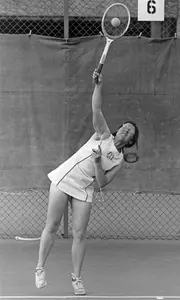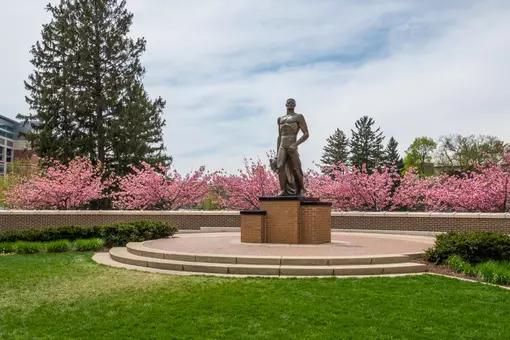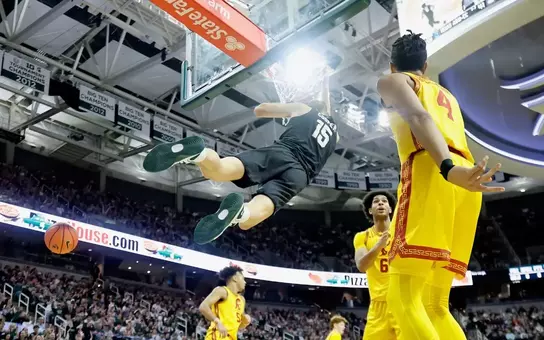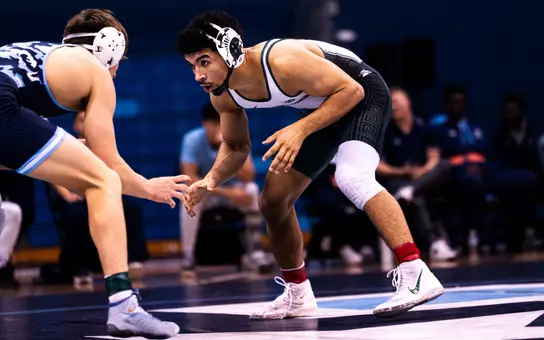Michigan State University Athletics

2014 MSU Athletics Hall of Fame Class: Sue Selke
9/18/2014 12:00:00 AM | General
Michigan State will induct six new members into its Athletics Hall of Fame on Thursday, Sept. 18. In the fourth of a six-part series this week on msuspartans.com, online columnist Steve Grinczel profiles former women's tennis Big Ten Champion Sue Selke.
By Steve Grinczel, MSUSpartans.com Online Columnist | @GrinzOnGreen
Every time opportunity knocked, Sue Selke answered the door.
The dialogue that usually ensued with the self-proclaimed "talker" led to one thing, and then another, and another all the way up to heights topped with her unexpected induction into the Michigan State Athletics Hall of Fame - for the time being.
"Usually, I'm an under-the-radar person, one of those behind-the-scenes people," Selke said before uttering an understatement of epic proportions. "I'm a doer." Selke began following a humble, albeit ambitious, blueprint long before:
--Becoming a member of MSU's first women's official tennis team in 1972;
--Winning three consecutive Big Ten No. 1 singles championships from '73-75;
--Leading the Spartans to back-to-back conference championships in '73-74.
"I couldn't have even told you what my record was," she said. "When they started to put out these stats I was like, `Wow, really?' "
Selke was introduced to the sport as a schoolgirl through a parks-and-recreation program run in her hometown of Detroit. She had gotten so good so fast, her first coach, Jim Kerwin, approached her late parents with an urgent plea.
"I can still remember him going to them and saying, `Look, she's getting better; we need to get her playing out of state,'" Selke said. "But I had five brothers and two sisters, and my dad had to work all the time and my mom was a stay-at-home mom with all those kids. But, the family of my doubles partner in juniors traveled all over the place, so I could travel with them.
"Sad to say my parents never saw me hit a tennis ball, but that doesn't mean they didn't encourage me. It was just play hard, pick something you can excel in and be the best you can be. You just take whatever opportunities you're hoping come your way. And then, Michigan State took a chance on me."
Although Title IX legislation was passed in 1972, provisions affording female student-athletes the same opportunities as males were still years away from being fully implemented when Selke began planning for college. There were no athletic scholarships available to female athletes, but MSU became the easy choice.
"I applied to three schools and Michigan State was the only one that offered me financial aid, and you could work it off on a work-study program," Selke said. "They believed in me, so that was another opportunity."
However, MSU didn't even field a women's tennis club in '71.
"For some reason there was a hiccup year," Selke said. "But the player who would end up being my doubles partner in college and was a year ahead of me, and her mother, kept going to Dr. Nell Jackson (the women's athletic director) and said, `Please don't drop the team, there's these girls coming, they're nationally ranked and we could have a good team.' Again, opportunity and belief.
|
"Tennis has been a great sport that I'm grateful to have picked up. Because of it, I've just been given opportunity after opportunity."
-Sue Selke
|
"The problem was, only four of us came in and we didn't have enough for a team. So, we put an ad in The State News and found a couple more who played recreational tennis, which was great because we had enough to have a team. Then we got a grad student named Sue Cutting, who agreed to be our coach."
The Spartans won all seven of their dual matches and finished fifth in the Big Ten tourney - officially recognized by the conference starting in '82 - Selke recalled. But, they won the next two conference titles under coach Elaine Hatton, who had been a highly accomplished junior.
"We didn't even know that until we had a little party at her house," Selke said. "The kids started bringing out her scrapbooks and no wonder she took us from fifth to first. We believed in everything she said."
Selke completed a stellar 30-2-1 record during her four-year MSU career, and while many of the victories have faded from memory, she distinctly remembers her only two losses as a Spartan.
As a freshman playing in the inaugural Big Ten's women's tennis tournament, Selke advanced to play the University of Wisconsin's Laurel Holgerson at UW's Neilsen Tennis Stadium in Madison.
"You've got to understand that Title IX hadn't kicked in yet and there were really no set rules," Selke said. "(Holgerson) had played on the (pro) tennis tour and then decided to go back to school. There wasn't any (governing body); you just played.
"That was probably one of my best matches ever played and I lost 6-0, 6-1. I still remember that every game went to deuce but the next two points (of each game) - I've never seen anything like that go by me in my life. But I really felt great. She even congratulated me because I was the only one who won a game against her in the whole tournament, and I thought, `Gosh, I really think I'm the second-best person in this tournament, but I don't know how I'm going to get good enough in a year to beat her even in one set.' "
Selke needn't have worried because Holgerson didn't return to the Badgers in '73, opening up the chance for her to take over the league's top spot. Selke's second defeat came against Ann Wilson, who she knew from the junior circuit and was Ohio State's top player.
"I had never beaten her all though juniors, never even won a set, but I'd get better each time I played her," said Selke, who was a year older. "So the first dual match we played, I beat her but the team lost 8-1 (in Columbus). In her sophomore year, my junior year, we played a dual match at Michigan State and I lost to her in a tiebreaker.
"Back then, you would play first one to five (points), so you could literally play for hours, but if was four-all in the tiebreaker, it would come down to the last point. So, of course, on my own home court, I lost the last point and my volley is still going out to Okemos Road. It never hit the court and it's ingrained in mind some 40 years later."
Selke and Wilson have remained good friends over the years and still exchange Christmas cards.
"Tennis has been a great sport that I'm grateful to have picked up," Selke said. "Because of it, I've just been given opportunity after opportunity. When you look back at it, you can't say your goal was ever to be in the Hall of Fame, but it was the opportunity, from my very first coach, to love the game and learn how to love competition."
About the time Selke graduated from MSU with a degree in physical education, a boom in indoor tennis facilities began throughout the state. To stay involved in tennis, she took a job as a desk receptionist at Court One Athletic Club in Lansing. That led to jobs as a teacher, instructor, head pro and director of tennis. Today, she is the executive director of Court One Athletic Club facilities in Lansing and Okemos.
And now, she has been validated as a pioneer in women's athletics as Michigan State's first female tennis Hall-of-Famer.
"We didn't have scholarships and all the other pressures that built over the years," Selke said. "It really was a group of gals who played for the love of the game. All we wanted to do is play tennis and win, and every year we'd go into Dr. Jackson's office and go, `Scholarships?'
"And she'd go, `Next year.' My message is, take advantage of your opportunities. I laugh because in my sport, `love' means `zero.' I at least made sure it meant more than nothing because it molded my whole career. I still love it and I love giving kids, adults, anybody an opportunity to play this sport of a lifetime."




